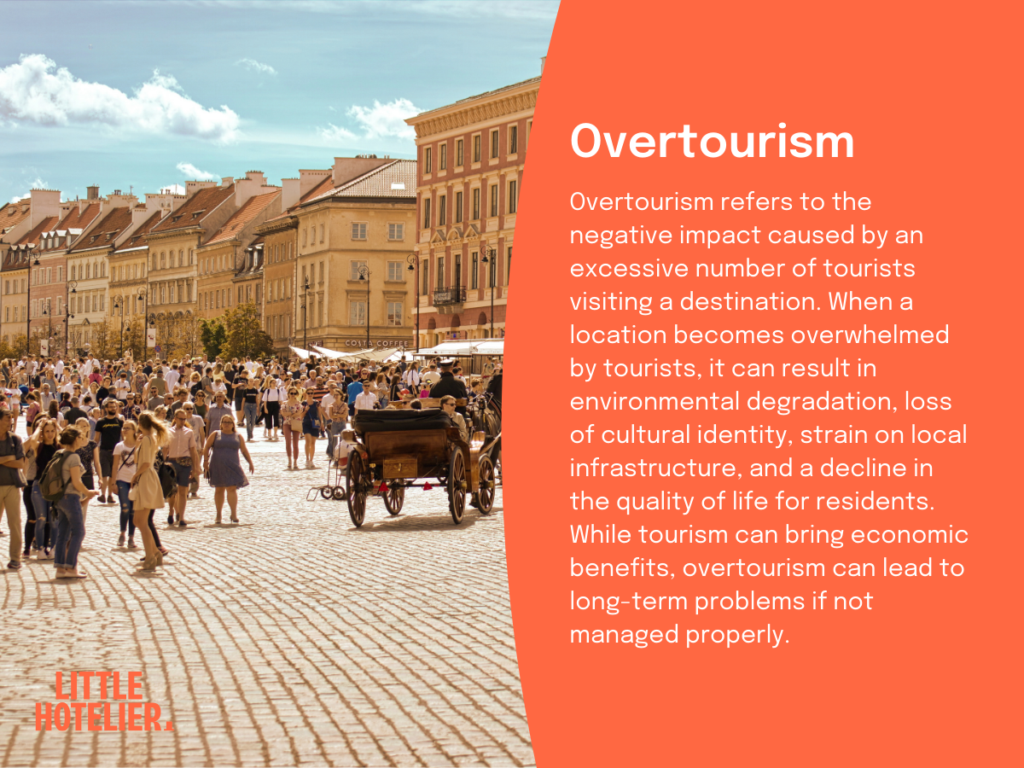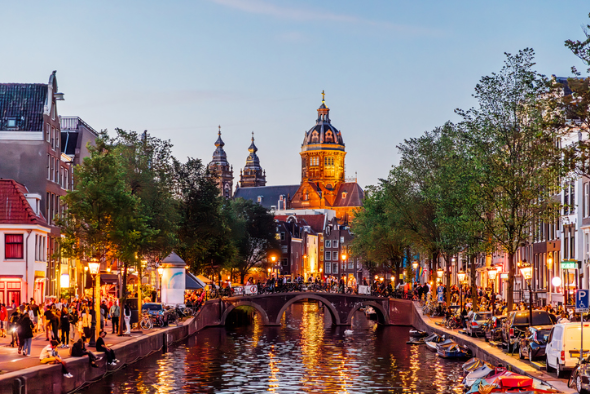What is overtourism?
Overtourism is a phenomenon that occurs when a destination attracts so many tourists that it begins to strain local infrastructure, ecosystems, culture and the well-being of the local community.
Understanding the overtourism definition helps small, independent hotels recognize this double-edged sword. On the one hand, hotel occupancy is consistently high. On the other hand, you face a challenge to manage this high guest demand while working to preserve your local community, culture and environment, to ensure your region retains the elements that attracted tourists in the first place.
In this guide we’ll focus on how overtourism affects smaller properties, and explain how small, independent hotels can navigate the direct impacts of overtourism on their communities and day-to-day operations, and transform this challenge into an opportunity for growth.
Maximise the money you make on every guest with direct bookings
OTAs charge a 15-25% commission fee on every booking. With Little Hotelier’s direct booking engine, you can keep that cash.
Learn moreWhy is overtourism a growing concern for small properties?
While overtourism can deliver significant bookings for a small hotel, it does bring its challenges. In the short-term, an independent hotel may struggle to meet the increasing demands placed on it in terms of day-to-day operations. In the long-term, overtourism can change the region the hotel has established itself in and the guests the hotel was designed to serve.
Rather than simply enduring overtourism’s challenges, small hotels can position themselves as part of the solution while building sustainable business growth. This strategic approach works whether you’re managing international visitors or focusing on domestic travel, as both markets contribute to overtourism pressures and present similar opportunities for thoughtful management.
When occupancy is high, so too is the pressure to meet guest demands. Housekeeping and maintenance teams may be overworked, and check-in processes can become overwhelming for front desk staff. There may be short turnarounds between guest stays, which can create stress across your teams.
Failing to maintain your operational standards can result in negative reviews, which in turn can affect your ability to attract bookings and charge what you’re worth.
But when you arm yourself with the right strategy, processes and tools, you can capitalise on the opportunities presented by overtourism, while successfully navigating the challenges of the situation.

Overtourism examples: Where are the biggest overtourism hotspots?
Venice, Barcelona, Amsterdam, Machu Picchu, and Thailand’s Maya Bay represent the world’s most recognized overtourism hotspots. These destinations face overwhelming visitor numbers that strain infrastructure and harm local communities. Social media has intensified the problem by creating viral “must-see” spots, with 80% of travelers now visiting just 10% of global destinations.
What’s more, global tourism is only growing: international arrivals rose from 949 million in 2010, to over 1.4 billion in 2019, and are projected to hit 2.4 billion by 2030. Without intervention, overtourism will only worsen.
However, affected destinations are fighting back with targeted solutions. Venice now charges entry fees and reinvests the revenue in city maintenance. Dubrovnik caps cruise ship arrivals to reduce street congestion. Thailand temporarily closed Maya Bay to allow coral reef recovery, while Machu Picchu uses timed entry tickets to control visitor flow. These strategies show that thoughtful management can help destinations reclaim balance.
Key takeaways summary
- Venice, Barcelona, Amsterdam, Machu Picchu, and Thailand’s Maya Bay represent some of the world’s most recognized overtourism hotspots.
- International arrivals will hit 2.4 billion by 2030, and with 80% of travellers currently visiting just 10% of destinations, overtourism will only worsen if not addressed.
- Regulations, entry limits and sustainability-focused strategies can help to mitigate the negative effects of overtourism.
How can small hotels manage overtourism?
Small hotels can manage overtourism by optimising pricing based on demand, encouraging sustainable guest behaviour and diversifying their offerings to cater to a wider range of guests. By adopting smarter pricing, promoting off-peak travel, and highlighting lesser-known local attractions and experiences, you can help reduce pressure on crowded areas while simultaneously enhancing guest satisfaction.
Why managing overtourism matters:
- It protects your local environment and culture, ensuring your destination retains its unique allure.
- It boosts long-term revenue by helping your hotel build a reputation for sustainability and responsible tourism.
- 64% of travellers actively avoid crowded attractions.
1. Adjust pricing
Dynamic pricing allows you to capitalize on high-demand periods while strategically redirecting visitors to quieter times. You can raise rates in line with demand during busy periods, then offer attractive discounts or package deals when local attractions are less crowded.
2. Promote off-peak seasons
Transform perceived “downtimes” into selling points by showcasing what makes each season special. Winter might offer cozy fireside dining and snow-covered landscapes, while spring could feature wildflower blooms and mild hiking weather. Develop specific content that positions quieter periods as premium experiences. Intimate wine tastings instead of crowded tours, or private beach access instead of packed summer scenes. Effective marketing during these off-peak periods requires highlighting these unique seasonal advantages rather than simply offering discounts.
3. Promote alternative experiences
Encourage guests to explore lesser-known attractions or enjoy uniquely local activities. Create unique, memorable and authentic experiences by partnering with local tourist boards, guides, artisans or wellness providers. By spreading tourist interest to different areas, you can ease strain on popular destinations while offering guests a more personal and unique stay.
4. Communicate transparently with guests
Share updates about crowd levels or local regulations with guests through email, your front desk, website and socials. Provide tips on sustainable tourism practices, such as visiting attractions early or exploring nearby alternatives. Advertise authentic experiences that serve to strengthen the existing local culture, rather than degrade it.
5. Automate hotel operations
Use an all-in-one system like Little Hotelier to streamline booking, payments and guest communications, to reduce admin and free up your team to focus on delivering the finest guest experiences possible. Automation also enables better forecasting and hotel management, helping you to stay organised and responsive during peak periods.
Key takeaways:
- Encourage off-peak travel and highlight less crowded experiences.
- Use pricing and automation tools to efficiently manage demand.
- Clearly communicate with guests and offer guidance on being a responsible tourist.
FAQs on overtourism
How to avoid overtourism?
Independent hotels can help mitigate overtourism by promoting off-peak travel, creating packages that highlight lesser-known attractions, and collaborating with local businesses to diversify the experiences they offer. By encouraging your guests to explore alternatives, you spread the impact of tourism more evenly across your region. By promoting sustainable and authentic experiences, you’ll also appeal to modern travellers who are conscious of choosing low impact travel options.
How is overtourism affecting the environment?
Overtourism can place significant strain on natural ecosystems through habitat loss and increased littering, pollution and foot traffic. For hoteliers, this can result in higher operational costs and damage to the reputation of your destination. By supporting eco-friendly initiatives and educating guests about sustainable practices, you can play a vital role in reducing the environmental impact of your guests and help to guarantee the future of tourism in your region.
What are the positive effects of overtourism?
While overtourism brings more than its share of challenges, it also has a range of positive effects. It can boost the local economy through increased spending on accommodation, dining and activities. It raises the global profile of a destination, attracting investment and infrastructure improvements. And the constant flow of guests can lead to serious business success for local hoteliers.
By Dean Elphick
Dean is the Senior Content Marketing Specialist of Little Hotelier, the all-in-one software solution purpose-built to make the lives of small accommodation providers easier. Dean has made writing and creating content his passion for the entirety of his professional life, which includes more than six years at Little Hotelier. Through content, Dean aims to provide education, inspiration, assistance, and, ultimately, value for small accommodation businesses looking to improve the way they run their operations (and live their life).
Table of contents
“Little Hotelier is professional and much appreciated. For a small hotel like ours, the ability to quickly change rates and availability is crucial.”
Owner, Soloqui in Zero Branco









Sean O’Neill,
Owner
Devereux Residences